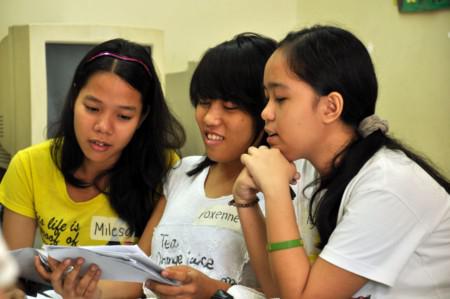Do you want to change the world? You're in the right place! Join us at W4 in empowering girls and women for the benefit of everyone! You can donate to our projects around the world, launch your own team fundraiser, (e-)volunteer your skills and/or spread the word about our work!
How does it work?
Choose one or more projects you care about from our portfolio of projects around the world, make a donation and see the life-changing, even life-saving, impact of your giving!
How does it work?
Create your own uber-cool fundraising team to raise funds for (a) project(s) you care about, then invite your friends/colleagues/family to donate and change the world with you! Multiply the good and multiply your impact!
How do gift cards work?
Offer a friend/colleague/loved one a unique, unforgettable gift with a W4 gift card! When you offer a W4 gift card, the recipient of your gift can choose a project to support from among our many girls' & women's empowerment projects around the world. The recipient of your gift card will receive updates throughout the year about the project, as well as W4 "goodies" relating to the project. So offer a W4 gift card today and spread joy & love!
999
Provide life-changing schooling opportunities for girls from the slums of Cebu City

The Challenge
One in five people in the Philippines are living on less than $1.25 per day. In Cebu City, the urban poor have to contend with appalling slum conditions, living in makeshift slums clustered in and around markets and even in cemeteries, where families can be found sleeping on the tombs. Living in these unsafe conditions, impoverished girls are particularly vulnerable because they are more likely to become victims of violence, sexual abuse, prostitution and sex trafficking, especially if they don't have access to education.
Too often, however, a girl’s education is simply beyond her family’s reach. Expenses such as fees, uniforms, books and other study materials are prohibitive for the poorest families. Many other parents are forced by circumstances to choose which of their children to send to school. Of those impoverished children who make it to school in the first place, many are later excluded or withdrawn because their parents’ meager and irregular income from informal slum activities such as selling street food or flowers cannot be stretched to meet the financial demands of schooling. In 2011, 90% of Filipino children enrolled in Grade 1, but only 72% of them completed primary school. A further 8% of students dropped out of high school.
The solutions we're proposing
W4’s field program is helping girls in the slums of Cebu City to claim their right to an education, enabling them to attend and complete public primary and secondary school, by providing school fees, school supplies and school uniforms.
The impact of giving
It does not require much to ensure that these girls gain an education – which gives them the greatest protection against the dangers of prostitution and sex trafficking. Your vital support helps to provide girls with the educational opportunities they need to shape their own futures and build better lives for themselves and their families.
Support us by sharing
and raising awareness!
Contributors

Gita
Francemarie-christine
FranceCaroline
SingaporeCaroline
SingaporeMarie-Christine
FranceMarie-Christine
Francelaurence
FranceMarie-Christine
FranceAlain
France
Camille
FranceFranck
FranceFranck
FranceFranck
FranceFranck
FranceDonna
Philippineszizi
United Statesvirginie
Francelaurence
France
Gaby
FranceGreat project!
Donate to this project
ARE YOU SURE YOU WANT TO DELETE?
ARE YOU SURE YOU WANT TO DELETE?
Are you sure ?
Uploading your photo now...
These fields must be completed before you can submit your project :
Save your draft first
In order to submit your project to our team, you have to save it first
Save your draft first
In order to translate your project, you have to save it first
Submit project translation
To proceed, please tick the ?Translation Available? box on the upper right hand side of your project drafting page.
Submit your translation
You are about to submit your translation. After submission, you will not be able to include further edits to your translation until it has been approved by our team.
Select 1-3 categories relevant to your project :
Digital Inclusion
Disabilities
E-mentoring
Economic empowerment
Education
Emergency Relief
End Child Marriage
Environment
Food Security
Health & HIV/AIDS
Human Rights
Human Trafficking & Exploitation
Microfinance
Role models
Technology
Violence against women
















